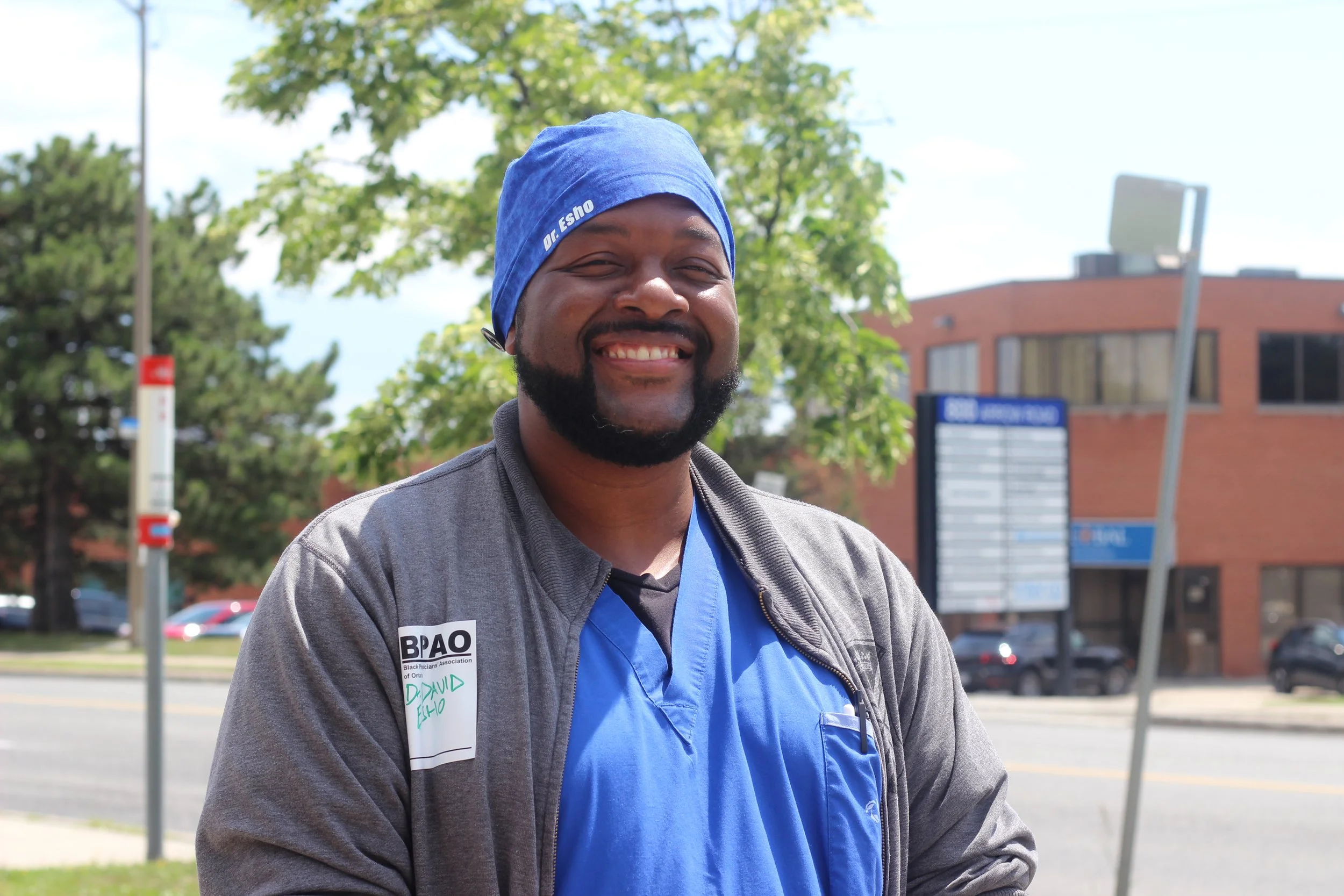Mentorship, Medicine, and Men’s Health: Dr. Esho’s Commitment to Community and Wellness
As a young boy growing up in a close-knit Nigerian community in Canada, Dr. David Esho had a dream, one he clung to with a clarity that many spend a lifetime trying to find. At just three years old, he told his mother he wanted to become a doctor. She, a woman of resilience and unwavering determination, encouraged his ambitions with the values she lived by: hard work, family, and the belief that excellence was not just a goal but a way of life.
The foundation of Dr. Esho’s ambition was built not only within his household but also within a supportive community. “I grew up in a somewhat small but very close-knit Nigerian community in Toronto,” he recalls. “There were so many people—uncles and aunties—who looked out for each other. It was all about ensuring the group succeeded.” Surrounded by professionals who shared their wisdom and encouragement, he found both inspiration and practical guidance. For Dr. Esho, pursuing a career in medicine wasn’t a decision born of a single moment but rather a lifelong sense of purpose fostered by those who believed in his potential. “It was always kind of a calling,” he says, “I always kind of knew I wanted to do it.”
Now a Staff Family Physician at the University Health Network, working with the Toronto Western Family Health Team, and an Assistant Professor in the University of Toronto’s Department of Family Medicine, Dr. Esho’s career reflects a dedication to both practice and education. He began his academic journey with a double major in cell biology at the University of Western Ontario, followed by medical school and residency training at the University of Toronto. Over the years, he has worked in diverse settings, including rural Ontario, urban centers, and Indigenous communities, building a breadth of experience that defines his approach to comprehensive family care.
Dr. Esho’s passion for education extends far beyond his own learning; it drives his work as a teacher and mentor to aspiring physicians. Over the past decade, he has been recognized with multiple teaching awards, including the prestigious Department of Family and Community Medicine Award of Sustained Excellence in Teaching. Reflecting on these honors, he notes the profound impact of mentorship: “One thing I really appreciated about that award was they actually asked some of my previous students to write letters of support. Reading how that small amount of time I spent with them shaped their lives was humbling.”
Beyond the classroom, Dr. Esho finds fulfillment in initiatives that directly impact his community, particularly his work during the COVID-19 pandemic. Leading Black health and wellness initiatives, he not only addressed vaccine hesitancy but also expanded the conversation to managing chronic conditions like diabetes and hypertension and tackling mental health challenges. “One of the most rewarding experiences of my career,” he reflects, “was sitting with members of my community, understanding their stories, and being a touchpoint for conversations that started with vaccination but grew into so much more.” Moments like reconnecting with a patient he had helped years earlier remind him of the lasting bonds formed through care. “It’s those simple things,” he says, “that make it all worthwhile.”
For Dr. David Esho, the path to medicine has been shaped by a lifelong openness to opportunity and a relentless pursuit of self-improvement. This is why he encourages the next generation of medical professionals to embrace the unpredictability of their careers, urging them to stay receptive to the unexpected opportunities that will inevitably arise. “Sometimes opportunities will present themselves to you, and it’s important to be open-minded and take them when they’re there,” he shares. For Dr. Esho, this mindset is essential in a field that demands continuous growth, challenging oneself to fill gaps in care and constantly learn new skills to better serve patients.
Outside of the hospital and classroom, Dr. Esho finds relaxation in the world of action movies, particularly classics like Ghostbusters and Star Wars. Though his time to indulge in these films is limited, he treasures the moments when he can share this passion with his children, hoping they’ll find the same joy in them. But just as importantly, he’s learning to balance his professional demands with personal wellness.
As he looks ahead, Dr. Esho is excited about his involvement in a new Men’s Health Initiative at his hospital, a project he believes will make a significant impact in the years to come. With a continued commitment to both personal and professional growth, he remains determined to improve not only his own life but also the lives of the people he serves.
Reflections on Men’s Health
As November highlights Men’s Health Awareness Month, Dr. David Esho sheds light on the unique challenges men face, particularly within Black communities. He underscores the concerning trend of men, especially young ones, avoiding regular healthcare engagement. “I often see my young male patients once every five years,” he observes, emphasizing the missed opportunities for preventative care. This disengagement leads to undiagnosed and untreated conditions like hypertension and diabetes, which disproportionately affect Black men. Dr. Esho encourages a proactive approach to health, urging men to reflect on their habits, whether it's alcohol consumption, physical activity, or prioritizing regular check-ups.
The conversation extends to mental health, a topic that remains heavily stigmatized among men. “There’s this mentality of being a man means I can’t be vulnerable or that mental illness is a sign of weakness,” Dr. Esho explains. “Honestly, I think sometimes the most courageous thing a man can do is reach out and ask for help.” Overcoming this stigma is a significant challenge, particularly for Black men.
Compounding the issue is Canada's underfunded mental health system, which spends significantly less on mental health services compared to other OECD countries. This lack of resources often leaves patients waiting months to access specialized care, a delay that can discourage many from seeking the help they need.



